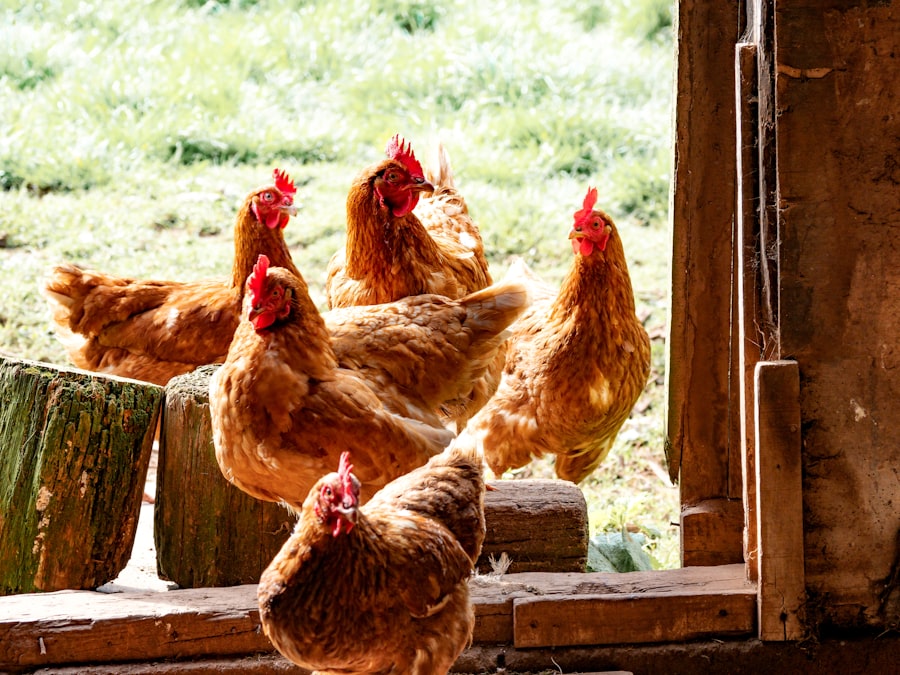Keeping chickens has been a practice that dates back thousands of years. It is believed that chickens were first domesticated in Southeast Asia around 6000 BC. Since then, they have become one of the most popular domesticated animals worldwide. People keep chickens for various reasons, including a steady supply of fresh eggs, pest control, fertilizer for their gardens, and even companionship.
Key Takeaways
- Keeping chickens can be a rewarding and enjoyable hobby for many people.
- Raising chickens can provide a source of fresh eggs and fertilizer for your garden.
- Choosing the right breed of chicken is important for egg production and temperament.
- Preparing and maintaining a clean and safe chicken coop is crucial for the health of your chickens.
- Proper feeding, watering, and egg collection are essential for the well-being of your chickens.
Benefits of Raising Chickens
One of the main benefits of raising chickens is the abundance of fresh eggs they provide. Not only are these eggs delicious and nutritious, but they also have a richer flavor compared to store-bought eggs. Additionally, raising chickens allows you to have control over the quality of the eggs you consume, as you can ensure that your chickens are fed a healthy diet and are not exposed to any harmful chemicals.
Another benefit of keeping chickens is their ability to control pests in your yard or garden. Chickens are natural foragers and will happily eat insects, slugs, and other pests that can damage your plants. This natural pest control method can help reduce the need for chemical pesticides and keep your garden healthy.
Chickens also provide an excellent source of fertilizer for your garden. Their droppings are rich in nitrogen, phosphorus, and potassium, which are essential nutrients for plant growth. By allowing your chickens to roam freely in your garden or by using their droppings as compost, you can improve the fertility of your soil and promote healthy plant growth.
Lastly, chickens can provide companionship and entertainment. They have unique personalities and can be quite entertaining to watch as they scratch the ground, take dust baths, or interact with each other. Many people find joy in spending time with their chickens and consider them as part of their family.
Choosing the Right Breed
When it comes to choosing the right breed of chicken, there are several factors to consider. First, you need to determine the purpose of keeping chickens. If you primarily want them for egg production, then you should choose a breed known for its high egg-laying capabilities. On the other hand, if you are more interested in meat production, there are specific meat breeds that grow quickly and have tender meat.
For beginners, some popular breeds include the Rhode Island Red, Plymouth Rock, and Sussex. These breeds are known for their docile nature, hardiness, and good egg production. They are also relatively easy to care for and adapt well to different climates.
When it comes to buying chickens, there are several options available. You can purchase them from local hatcheries, farm supply stores, or even online. It is important to buy from reputable sources to ensure that you are getting healthy and well-cared-for chickens.
Preparing Your Chicken Coop
Before bringing home your chickens, it is essential to have a suitable coop ready for them. The size of the coop will depend on the number of chickens you plan to keep. As a general rule of thumb, each chicken should have at least 4 square feet of space inside the coop and 10 square feet of outdoor space.
The location of the coop is also crucial. It should be placed in an area that is well-drained and protected from extreme weather conditions. It should also have good ventilation to prevent the buildup of ammonia from chicken droppings.
When it comes to materials needed for the coop, you will need sturdy walls and a roof to protect your chickens from predators and the elements. The floor should be easy to clean and preferably made of materials such as concrete or wood with a layer of bedding on top.
Nesting boxes and roosts are also essential components of a chicken coop. Nesting boxes provide a comfortable and private space for hens to lay their eggs, while roosts give chickens a place to perch and sleep. It is recommended to have one nesting box for every 3-4 hens and enough roosting space for each chicken to comfortably perch.
Chicken Coop Maintenance
Keeping your chicken coop clean is crucial for the health and well-being of your chickens. Regular cleaning helps prevent the buildup of bacteria and parasites that can cause diseases. It is recommended to clean the coop at least once a week, removing any droppings, replacing bedding, and disinfecting surfaces.
In addition to regular cleaning, it is important to take measures to prevent pests and predators from entering the coop. This can be done by securing the coop with sturdy fencing, covering any openings with wire mesh, and using predator-proof latches on doors.
Winterizing the coop is also necessary if you live in an area with cold winters. This involves insulating the coop, providing additional bedding for warmth, and ensuring that there are no drafts or leaks that could let cold air in. It is also important to provide your chickens with fresh water that is not frozen.
Feeding Your Chickens

Feeding your chickens a balanced diet is essential for their health and egg production. There are different types of chicken feed available, including pellets, crumbles, and mash. These feeds are formulated to provide the necessary nutrients for chickens at different stages of life.
The amount of feed to give your chickens will depend on their age, breed, and activity level. As a general guideline, adult chickens should be fed about ¼ to ½ pound of feed per day. It is important not to overfeed your chickens as this can lead to obesity and health problems.
In addition to their regular feed, chickens can also enjoy treats such as fruits, vegetables, grains, and mealworms. These treats should be given in moderation and should not exceed 10% of their total diet.
Watering Your Chickens
Clean water is essential for the health and well-being of your chickens. Chickens need access to fresh water at all times, especially during hot weather when they are more prone to dehydration. It is recommended to use waterers specifically designed for chickens, as they prevent spillage and contamination.
The waterers should be cleaned regularly to prevent the buildup of algae, bacteria, and other contaminants. It is also important to change the water frequently, especially during hot weather, to ensure that it remains clean and fresh.
Egg Production and Collection
Chickens typically start laying eggs at around 5-6 months of age, although this can vary depending on the breed. Most hens will lay one egg every 24-26 hours, with peak production occurring in the first year. After that, egg production may decrease slightly but can continue for several years.
To ensure that you collect clean and healthy eggs, it is important to provide your chickens with clean nesting boxes filled with soft bedding such as straw or wood shavings. The eggs should be collected daily to prevent them from being pecked or soiled by the chickens.
When collecting eggs, it is important to handle them gently to avoid cracking or damaging the shells. It is also recommended to store the eggs in a cool place, preferably in a refrigerator, to maintain their freshness and quality.
Chicken Health and Illnesses
Keeping your chickens healthy is crucial for their overall well-being and productivity. There are several common illnesses that can affect chickens, including respiratory infections, parasites, and nutritional deficiencies.
To prevent these illnesses, it is important to provide your chickens with a clean and well-maintained coop, a balanced diet, and regular veterinary care. Signs of a sick chicken include lethargy, loss of appetite, abnormal droppings, difficulty breathing, or changes in behavior. If you notice any of these signs, it is important to consult a veterinarian who specializes in poultry health.
Enjoying Your Chickens
Keeping chickens can be a rewarding and enjoyable experience. In addition to the benefits of fresh eggs, pest control, and fertilizer, chickens can also provide companionship and entertainment. Spending time with your chickens, observing their behaviors, and interacting with them can be a source of joy and relaxation.
To make the most of your chicken-keeping experience, it is important to educate yourself about their care and needs. There are numerous resources available, including books, websites, and local poultry clubs, where you can find information and support from experienced chicken keepers.
By providing your chickens with a suitable coop, a balanced diet, clean water, and regular care, you can ensure that they lead healthy and happy lives. In return, they will provide you with fresh eggs, natural pest control, and a unique connection to the natural world.
If you’re interested in keeping chickens, you’ll definitely want to check out this informative article on Poultry Wizard’s website. It covers everything you need to know about keeping chickens, including tips on choosing the right chicken coop. For those looking for a convenient and easy-to-assemble option, the article recommends the Snaplock Chicken Coop, which you can learn more about here. If you’re in the Chester, SC area and prefer a pre-built chicken coop, there’s also a helpful article on the Chicken Coop Chester SC option available here. Additionally, if you have an old shed that you’d like to repurpose into a chicken coop, Poultry Wizard has a great guide on how to convert a shed into a chicken coop here. Happy chicken keeping!
FAQs
What are the benefits of keeping chickens?
Keeping chickens can provide a source of fresh eggs, fertilizer for gardens, and entertainment. They also help control pests and weeds in the yard.
What do chickens need to be healthy?
Chickens need access to clean water, a balanced diet of feed, shelter from the elements, and protection from predators. They also need space to move around and exercise.
How often do chickens lay eggs?
The frequency of egg-laying depends on the breed of chicken and their age. On average, chickens lay one egg per day, but some breeds may lay more or less frequently.
What should I feed my chickens?
Chickens require a balanced diet of protein, carbohydrates, and vitamins. Commercial chicken feed is available at most feed stores and provides all the necessary nutrients. Supplemental treats such as fruits and vegetables can also be given in moderation.
How do I keep my chickens safe from predators?
Chickens are vulnerable to predators such as foxes, raccoons, and hawks. To keep them safe, provide a secure coop and run with sturdy fencing. Lock the coop at night and supervise free-range time during the day.
How do I clean my chicken coop?
Cleaning the coop regularly is important for the health of your chickens. Remove soiled bedding and replace with fresh straw or shavings. Scrub the coop with a mild detergent and rinse thoroughly. Allow the coop to dry completely before adding new bedding.
What are some common health issues for chickens?
Common health issues for chickens include respiratory infections, mites and lice, and egg-laying problems. Regular check-ups and proper care can help prevent these issues. Consult a veterinarian if you suspect your chickens are ill.
Meet Walter, the feathered-friend fanatic of Florida! Nestled in the sunshine state, Walter struts through life with his feathered companions, clucking his way to happiness. With a coop that’s fancier than a five-star hotel, he’s the Don Juan of the chicken world. When he’s not teaching his hens to do the cha-cha, you’ll find him in a heated debate with his prized rooster, Sir Clucks-a-Lot. Walter’s poultry passion is no yolk; he’s the sunny-side-up guy you never knew you needed in your flock of friends!







